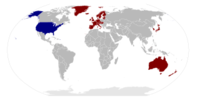-
CBP unveils measures to address use of force along the border
Stung by criticism that its agents are using excessive force along the U.S.-Mexico border – including the conclusions of DHS IG that many CBP officers and Border Patrol agents do not understand their agency’s rules about the use lethal force — Customs and Border Protection (CBP) on Wednesday unveiled measures it said would address the problem.
-
-
Border communities decry Washington’s misguided emphasis on border security
Billions of dollars have been spent in an effort to secure the U.S.-Mexico border. Many border communities see investment in cross-border commerce, rather than spending money on fences and patrol agents, as a better way to reduce crime and illegal immigration. “We don’t need more Border Patrol agents — we need more customs agents,” says El Paso mayor John Cook.
-
-
California granting driver's licenses to illegal aliens threatens homeland security: critics
Last Thursday night’s approval of AB 60 by both houses of the California Legislature, granting driver’s licenses to illegal aliens, poses a serious threat to the security of all Americans, critics charge. The critics say that in 2005, in response to recommendations by the 9/11 Commission, Congress enacted the REAL ID Act in order to discourage state governments from issuing driver’s licenses and other identity documents to illegal aliens – and that California’s AB 60 is designed to circumvent requirements of REAL ID Act.
-
-
Senior U.S., Canadian government officials to gather at US/Canada Border Conference
For two days on 12-13 September, Detroit’s renovated Cobo Center will be host to a gathering of U.S. and Canadian border security officials and industry professionals meeting to discuss a myriad of important issues relating to border protection and facilitation of legitimate trade and travel between the United States and Canada.
-
-
What you haven’t heard about immigration reform and border security

The Senate and House must find a way to resolve our current immigration dilemmas. We owe a fairer, more just system of laws to all our immigrants, both illegal and legal. And, yes, we must find ways to address issues of national security as well. It’s not going to be easy to shape such legislation, but we should demand no less from both Democrats and the Republicans.
-
-
More resources allocated to border security without a clear measure of effectiveness

Billions of tax-payer dollars have been spent to secure the U.S-Mexico border from illegal immigration and drug trafficking. Yet, according to two federal oversight agencies, it is not clear whether the investments made are providing a favorable return. More importantly, there is no mechanism to measure the effectiveness or success of the investments made to secure the border.
-
-
DHS tentatively grants asylum to seven Mexicans
DHS has tentatively granted asylum to seven Mexican immigrants. Some of the immigrants were previously living the United States illegally, but left and tried to re-enter as part of a protest against the U.S. deportation policies, and in support of granting citizenship to immigrants who were to the United States as children.
-
-
House GOP caucus grapples with immigration issue
During a closed-door meeting of the House Republican caucus on Wednesday, House Speaker John Boehner (R-Ohio) and Representative Paul Ryan (R-Wisconsin) urged fellow GOP lawmakers to pass an immigration bill. Boehner reiterated his position that no immigration bill will be brought to the House floor without the support of the majority of the House GOP caucus. Participants in the meeting all agreed that they did not trust the Obama administration to enforce either immigration laws or border security provisions.
-
-
House speaker clarifies position on immigration reform
House Speaker John Boehner (R-Ohio) told reported on Monday that improvements in border security must be “in place” before a pathway to immigration is to begin. Boehner will head a special meeting of the House Republican Conference today to debate immigration reform.
-
-
Lawmakers want to ease travel to U.S. as part of immigration legislation

A bi-partisan group of House lawmakers is working to include a provision in the House immigration legislation which will make it easier to travel to the United States. Travel industry groups support the effort, having fought for years to get the government to relax security measures. The industry has argued that these measures have turned off many foreigners from traveling to the United States.
-
-
Following DOMA decision, DHS will offer gay couples same benefits as straight couples
DHS secretary Janet Napolitano said that following the Supreme Court’s decision to declare the Defense of Marriage Act (DOMA) unconstitutional, her department will work to give benefits to same-sex legally married couples.
-
-
Senate passes historic immigration reform bill
The Senate yesterday, on a vote of 68-32, approved a sweeping immigration overhaul bill, the most important immigration measure since the 1986 Immigration and Reform Act (IRCA). The measure offers a path to citizenship to about eleven million illegal immigrants currently in the United States and allocates billions of dollars to bolstering border security.
-
-
Our farblondzhet senators

The Senate immigration reform bill has been presented as an effort to resolve the many complex problems resulting from the Immigration and Reform Act (IRCA) of 1986. Whether the bill passed by the Senate yesterday will succeed remains to be seen, but what is not in doubt is the fact that the border security provisions in the bill, in the words of Sen. Patrick Leahy (D-Vermont), read “like a Christmas wish list for Halliburton” and other big defense contractors. This is unfortunate, because the U.S.-Mexico border has become a graveyard for a long list of ambitious, technology-heavy – but ultimately ineffective and exceedingly wasteful – programs.
-
-
House lawmakers disagree on how to move forward on immigration reform

If the sweeping immigration overhaul bill passes the Senate, as now appears likely, House Republicans may be under intense pressure to move quickly on their own bill, so the versions may go to reconciliation. Members of the House, though, say they are in no rush, leaving the fate of immigration reform in doubt. Some analysts note that twice in recent months, when the House failed to come up with its own version of a bill, it passed the Senate version as-is: In January, the House passed the Senate-White House compromise to avert tax increases, and in February it passed the Senate version of the Violence Against Women Act.
-
-
Texas sees rise in number of border crossers dying in the summer heat
During the hot summer months, dozens of migrants die trying to cross the southern border in Arizona and California. Now, Texas is seeing an increase in the number of immigrant dying as they cross the U.S.-Mexico border and lose their way in the desert.
-
- All
- Regional
- Water
- Biometrics
- Borders/Immig
- Business
- Cybersecurity
- Detection
- Disasters
- Government
- Infrastructure
- International
- Public health
- Public Safety
- Communication interoperabillity
- Emergency services
- Emergency medical services
- Fire
- First response
- IEDs
- Law Enforcement
- Law Enforcement Technology
- Military technology
- Nonlethal weapons
- Nuclear weapons
- Personal protection equipment
- Police
- Notification /alert systems
- Situational awareness
- Weapons systems
- Sci-Tech
- Sector Reports
- Surveillance
- Transportation
Advertising & Marketing: advertise@newswirepubs.com
Editorial: editor@newswirepubs.com
General: info@newswirepubs.com
2010-2011 © News Wire Publications, LLC News Wire Publications, LLC
220 Old Country Road | Suite 200 | Mineola | New York | 11501
Permissions and Policies
Editorial: editor@newswirepubs.com
General: info@newswirepubs.com
2010-2011 © News Wire Publications, LLC News Wire Publications, LLC
220 Old Country Road | Suite 200 | Mineola | New York | 11501
Permissions and Policies
